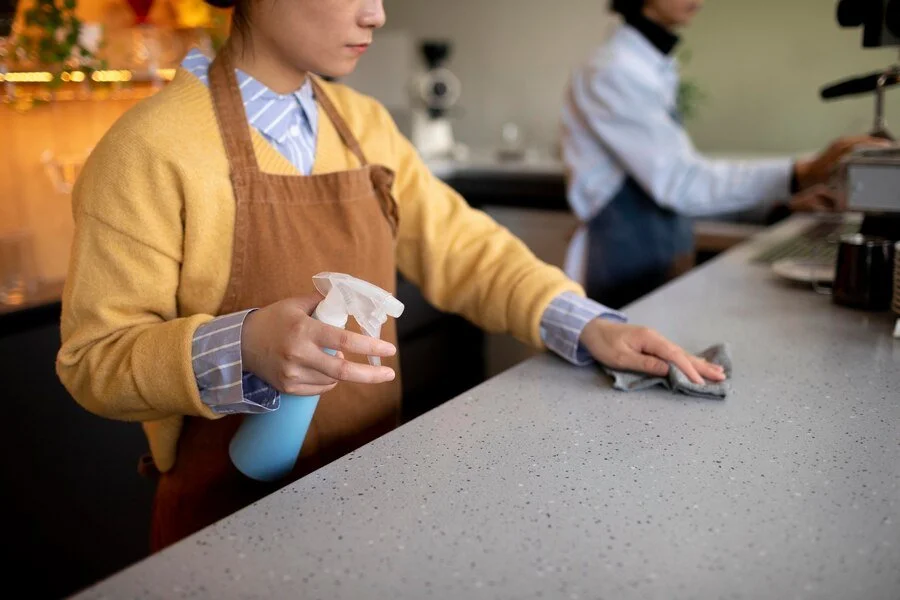How To Remove Stains From Quartz Countertops?
/Quartz countertops are durable, low maintenance, and beautiful, rendering a stunning aesthetic to kitchens and bathrooms. Despite quartz's high resistance to stains, it isn't completely impervious. Some things stain the surface occasionally, such as coffee spills and greasy cooking messes, among many others. The excellent news with quartz countertops is that they are easy to clean and can remove any stain easily as long as the proper technique is followed. This blog will guide you on removing stains from quartz countertops while giving you some tips for keeping them as they came from the store.
Understanding Quartz Countertops
Quartz is an artificial stone that combines crushed natural quartz crystals with resins, polymers, and pigments. The final composite material is nonporous, meaning it cannot absorb liquids nor harbor bacteria like granite and marble. Although this implies quartz has a better resistance against stains, it's not a stain-proofed material.
All these substances--coffee, wine, oil, food coloring, and makeup --make up common stains. The best cleaning of quartz countertops calls for promptness in addressing the stains and using very mild, nonabrasive cleaning to avoid damaging the surface.
How To Remove Stains From Quartz Countertops?
While quartz is stain-resistant, some residue may form marks that are difficult to clean, especially when the marks have been there for a while. For tough stains, you will require more brutal methods.
2. Baking Soda Paste for Tough Marks
Baking soda is a mild abrasive, successfully removing deep stains without scratching the quartz surface. Mix baking soda with water, and smear the paste on the stained area
Working Procedures
Mix equal proportions of water and baking soda to make a thick paste
Apply the paste to the stained area and sit for 5 to 10 minutes.
Mop the paste softly with a soft cloth or sponge, then wipe clean with a damp cloth. Dry off with a microfiber towel.
This is good for greasy stains, food splatters, surface marks, and anything else you're working with that requires extra elbow grease.
2. Isopropyl Alcohol for Sticker Residue
This stain on quartz countertop is caused by sticky substances such as glue, nail polish, or food syrup. You can dissolve them using rubbing alcohol or isopropyl alcohol. The technique of using this liquid makes it easy to break down because alcohol is the solvent that dissolves adhesives and sticky residues.
How to do it:
Moisten a soft cloth with isopropyl alcohol (70-90%).
Rub the stained area lightly.
Wipe until all the sticky residue is removed.
Rinse the area with warm water and dry it with a soft towel.
Use alcohol sparingly, as it will dry out the surface in the long run. It is fantastic for doing quick repairs on more resistant stains.
How to Remove Deep Stains or Discoloration from Quartz?
Grease or food dye/wine/coffee stains sometimes penetrate too deep to be easily wiped away. The intensity of the stain will dictate how intense the cleaning agent needed will be. Here is how you can handle that.
1.Quartz Cleaner (if necessary)
If the stain on quartz countertop is tough and homemade cleansers are unable to remove the stain, you may opt for a professional cleaner specialising in quartz countertops. Various products are specifically designed to remove stains on quartz surfaces without etching or marking them. Remember to check if the cleaner one decides to use can be applied to quartz and does not have any harmful chemicals or abrasives to mark the surface.
Step-by-step
Follow the instructions on the quartz stain remover.
Apply the cleaner or stain remover to the stained area.
Let it sit for a few minutes, then wipe off with a damp cloth
2.Nonabrasive Cleaner (Hydrogen Peroxide for Organic Stains)
For organic stains, such as coffee, wine, or food, hydrogen peroxide solution (3%) might break down the stain. Applying this should follow the instructions given below on the stained area.
Step-by-step
Apply a small amount of hydrogen peroxide on the stain.
Let it sit for 5-10 minutes.
Wipe away the solution with a damp cloth.
Rinse with clean water and dry the surface.
Note: Always test a small, inconspicuous area first to ensure the hydrogen peroxide will not damage the surface. Do not use hydrogen peroxide on colored or dark-colored quartz because it could discolor.
How to Prevent Stains from Coming in the First Place?
Keep Your Quartz Countertops Looking New Prevention of stains means they will never happen. Though quartz is durable, carrying out these tips will ensure the countertop maintains its pristine look.
1. Clean up spills immediately: Quartz is not porous, so liquids will not soak into the top, but it's always wise to clean up spills quickly. Particularly with staining liquids like wine, coffee or fruit juice, cleaning them quickly can prevent marks from forming.
2. Use Coasters, Cutting Boards and Trivets: Place coasters under all beverages and trivets under hot pots or pans so you don't get stains. Slice or chop on the cutting board since knives and acidic foods may eventually dull the surface.
3. Clean Regularly: Clean quartz countertops regularly. Wipe surfaces after cooking or eating to prevent grease or dirt build-up.
While known for their durability and stain resistance, accidents can still happen with quartz countertops. Proper cleaning techniques and a little knowledge can easily remove most stains, keeping your quartz countertops looking great for years. From light cleaning techniques involving dish soap and water to more intensive methods like baking soda or hydrogen peroxide for tougher stains, you ought to find plenty of ways to maintain the beauty of your countertop. With regular monitoring of spills, proper cleaning tools, and routine maintenance, you will have an elegant, beautiful quartz countertop that is both functional and aesthetically pleasing.








